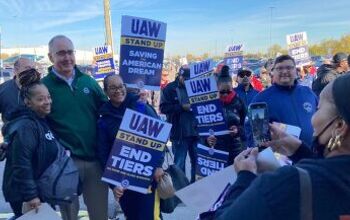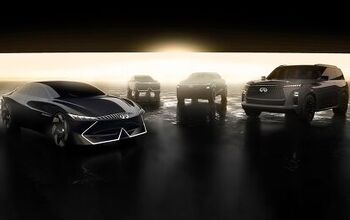EU Carmakers Rattle Sabers, Want Money, Accept Hyundai

The heads of the European automobile industry are assembling in London for their annual European Automobile Manufacturers’ Association meeting. While they were there, they dropped in with UK’s Prime Minister David Cameron to talk a little politics. Norbert Reithofer of BMW, Sergio Marchionne of Fiat, Carlos Ghosn of Renault, Nick Reilly of GM Europe and their leader Dieter Zetsche, president of the association and chief of Daimler, asked for assistance with fair free trade with major economies such as India and Japan, government support for the swift introduction of breakthrough technologies and less bureaucracy through lean regulations. All noble goals. But the BBC found a fly in the ointment:
“The European motor industry has called for non-European governments to scale back assistance for their own automotive industries.
But at the same time, they say they want more government support at home.”
“Government support for the swift introduction of breakthrough technologies” is a thinly veiled plea for government money to fund (allegedly) research into EVs. Zetsche told Cameron that Europe’s automakers invest over €30 billion into R&D each year. (His ACEA say it’s “over €26 billion, but who wants to quibble about a little change.) And what about a little government help?
“Fair free trade with major economies such as India and Japan,” is likewise easily breakable code. “The Indian market was effectively closed to European car makers due to high tariffs and excise duties,” the association’s Secretary General Ivan Hodac told the Wall Street Journal. The same day, BMW announced a GBP500 million ($812 million) investment into its Mini plant in Oxford. So it was a good time to ask for some reciprocity.
Complaining about trade barriers in Japan (where the custom duty on cars is zero) was a little mistimed, considering that the day before, Ghosn’s Nissan said it would invest GBP192 million in the U.K. to design, engineer and build the next version of the Qashqai.
China wasn’t mentioned. China charges 25 percent duty, but business with China doesn’t give European automakers reason to complain.
At the meeting, the General Assembly of the European Automobile Manufacturers’ Association did at least on good deed: They accepted Hyundai as a card-carrying member. To qualify for association membership, one must have production in Europe. Hyundai has plants in Slovakia and the Czech Republic. Hyundai tried for years to get accepted to the exclusive club, but were repeatedly rebuffed. Now finally, the association welcomed “Hyundai in our midst and are convinced the company will make a valuable contribution to the work of our association”, said Ivan Hodac.

Bertel Schmitt comes back to journalism after taking a 35 year break in advertising and marketing. He ran and owned advertising agencies in Duesseldorf, Germany, and New York City. Volkswagen A.G. was Bertel's most important corporate account. Schmitt's advertising and marketing career touched many corners of the industry with a special focus on automotive products and services. Since 2004, he lives in Japan and China with his wife <a href="http://www.tomokoandbertel.com"> Tomoko </a>. Bertel Schmitt is a founding board member of the <a href="http://www.offshoresuperseries.com"> Offshore Super Series </a>, an American offshore powerboat racing organization. He is co-owner of the racing team Typhoon.
More by Bertel Schmitt
Latest Car Reviews
Read moreLatest Product Reviews
Read moreRecent Comments
- Lichtronamo Watch as the non-us based automakers shift more production to Mexico in the future.
- 28-Cars-Later " Electrek recently dug around in Tesla’s online parts catalog and found that the windshield costs a whopping $1,900 to replace.To be fair, that’s around what a Mercedes S-Class or Rivian windshield costs, but the Tesla’s glass is unique because of its shape. It’s also worth noting that most insurance plans have glass replacement options that can make the repair a low- or zero-cost issue. "Now I understand why my insurance is so high despite no claims for years and about 7,500 annual miles between three cars.
- AMcA My theory is that that when the Big 3 gave away the store to the UAW in the last contract, there was a side deal in which the UAW promised to go after the non-organized transplant plants. Even the UAW understands that if the wage differential gets too high it's gonna kill the golden goose.
- MKizzy Why else does range matter? Because in the EV advocate's dream scenario of a post-ICE future, the average multi-car household will find itself with more EVs in their garages and driveways than places to plug them in or the capacity to charge then all at once without significant electrical upgrades. Unless each vehicle has enough range to allow for multiple days without plugging in, fighting over charging access in multi-EV households will be right up there with finances for causes of domestic strife.
- 28-Cars-Later WSJ blurb in Think or Swim:Workers at Volkswagen's Tennessee factory voted to join the United Auto Workers, marking a historic win for the 89- year-old union that is seeking to expand where it has struggled before, with foreign-owned factories in the South.The vote is a breakthrough for the UAW, whose membership has shrunk by about three-quarters since the 1970s, to less than 400,000 workers last year.UAW leaders have hitched their growth ambitions to organizing nonunion auto factories, many of which are in southern states where the Detroit-based labor group has failed several times and antiunion sentiment abounds."People are ready for change," said Kelcey Smith, 48, who has worked in the VW plant's paint shop for about a year, after leaving his job at an Amazon.com warehouse in town. "We look forward to making history and bringing change throughout the entire South." ...Start the clock on a Chattanooga shutdown.


































Comments
Join the conversation
Bertel in general European car makers don't get much state aid do they? In France they certainly get lot's of help, but that's more the exception than the rule. During the financial crisis how much help did the UK government give the British car producers? JLR pleaded for cash and were rebuffed several times. In contrast GM, Chrysler and car makers all over the world got massive tax payer support/ bailouts. Really if we want to show our anger at bailouts we should all buy a Range Rover :-)
How exactly are free trade agreements a noble goal?